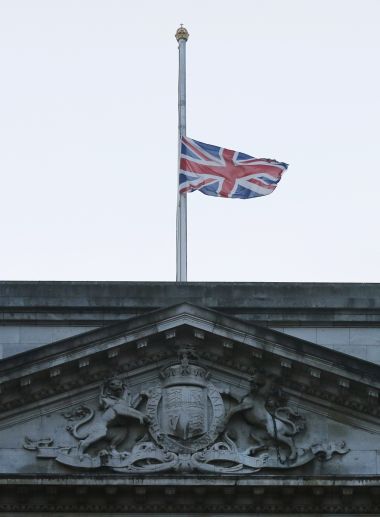Please don't go: Why Scotland's separation will kill my British identity

With a mixture of Scottish and Canadian heritage, I'm not alone in being British but not English. Many second and even first generation immigrants of all faiths and none and from all around the world must feel the same: they may not be ethnically English, but fall under the broad church of Britishness.
But now, the very concept of Britishness is under threat of abolition, with the prospect of a second referendum on Scottish independence declared by Nicola Sturgeon, the Scottish National Party (SNP) leader for between autumn 2018 and spring 2019.
When I put this case against the breakup of the UK to Sturgeon's predecessor, the then First Minister Alex Salmond in 2011, he declared that 'Britishness' was defunct. 'Unionism hasn't been based on culture,' he said dismissively.
And yet, the point about the 300-year-old Union between Scotland and England is that it has always been greater than the sum of its parts.
When the wretched, divisive second referendum comes, it will fall to Unionists of all parties to campaign for the United Kingdom as we know it. To them, the — irreversible — end of over three centuries of successful cultural, political and economic integration would be a backward step, not a 'progressive' one as the SNP argues.
And this is largely because nationalism of all kinds is regressive. 'Workers of the world unite' was the revolutionary rallying cry precisely because borders represent false divisions between people who are not so different: the problems of a single mother on a Glasgow estate are, surely, the same as those of one in Hull – or London for that matter.
But though I hate to admit it, the worst element of all in the current debate, is that the Unionist case is now so much harder to make: because of Brexit. Whisper it, but it is so much more difficult to dismiss Scottish nationalism when narrow English nationalism is the cause behind the UK's move to leave the EU. What case do those of us Anglo-Scots based in London have to cry 'Please don't go' when the alternative for Scots who voted to remain in the EU is to stay tied to an English and Welsh rump that is drifting away from the Continent?
So how did it come to this, a sense that such a rich Union is dying and will die in the next couple of years?
On the face of it, the Tories – the officially named Conservative and Unionist party – are ironically to blame. It was, after all, David Cameron who, having fought passionately for the Union in the 2014 referendum, then allowed a Brexit poll which anyone could see would divide the UK. And it is Theresa May who is apparently overseeing a 'hard Brexit' which is deepening that division and handing Sturgeon her trump card.

I have always suspected that there is a secret strand of cynical tacticians in the Tories – including figures like Michael Portillo and Alan Duncan – who would happily see the Union break apart, for the obvious electoral advantage that would be gained by governing Tory-inclined England and not progressive Scotland.
Less conspiratorially, Tory cock-ups have historically fueled the case for Scottish independence. Margaret Thatcher's preference for low inflation at the cost of rising unemployment, and tax and spending cuts, hit Scotland hard. The monetarist consensus, which began in the 1980s and continues today, goes against the grain north of the border.
In the first two years of Thatcher's administration, Scotland lost a fifth of its workforce, with an assault on the coal and textile industries and pit closures across the country. The final straw was her use of Scotland in 1989 as a guinea pig for the policy which eventually brought her down: the poll tax.
But the truth is that historically, Labour is at least as much to blame. There have seldom been more infuriating headlines than one last week which read: 'Jeremy Corbyn "absolutely fine" with second Scottish independence referendum'.
To be fair to Corbyn, he may be too stupid to understand the progressive case for the Union, and appears to be something of a closet nationalist himself, having almost certainly privately backed Brexit.
No, the real blame – and this is a very unfashionable view – lies with Labour's deeply misguided policy of devolution to the Scottish Parliament, which began in 1998.
For decades, a smaller SNP had debated whether devolution was a stepping stone to independence. Salmond, who has always called himself a 'gradualist,' was convinced it was.
With what has now proven to be remarkable prescience, the late Labour intellectual Tam Dalyell outlined the dangers in his 1977 book Devolution: The End of Britain? Dalyell predicted the emergence of an insoluble question in the wake of devolution: Why should Scottish members of the British Parliament continue to have a say over English affairs while English MPs lose their influence over Scottish governance? This conundrum became known as 'the West Lothian question,' named after Dalyell's constituency.
Crucially, Dalyell questioned the motives of a Labour party increasingly desperate – as they are to this day -- to fend off the SNP in Scottish constituencies. Today, there is a debate in Labour over whether to embrace the independence cause.
When, decades after Dalyell's warning Tony Blair implemented the policy he had inherited from the former Labour leader John Smith, he said that creating a Scottish parliament with powers over health and education would 'lance the boil' of independence. How wrong he was and how right, alas, was the gradualist Salmond.
Now, with another referendum surely on the way despite the Prime Minister's doomed attempts to stop it, there are many reasons to lament the death of the Union.
For me, one of those is that I and many others will almost certainly lose our spiritual home.











